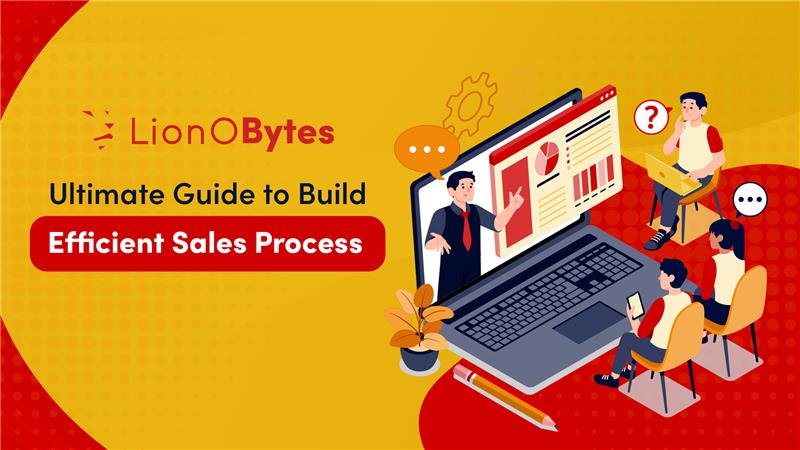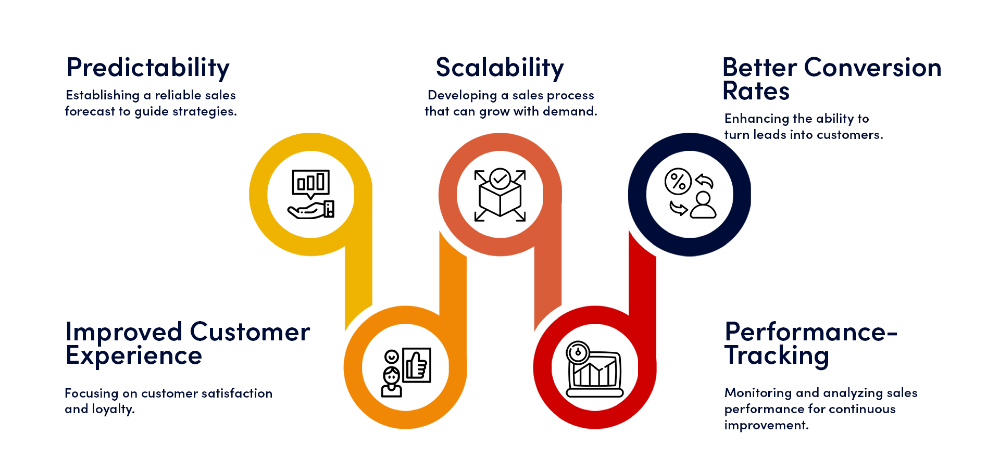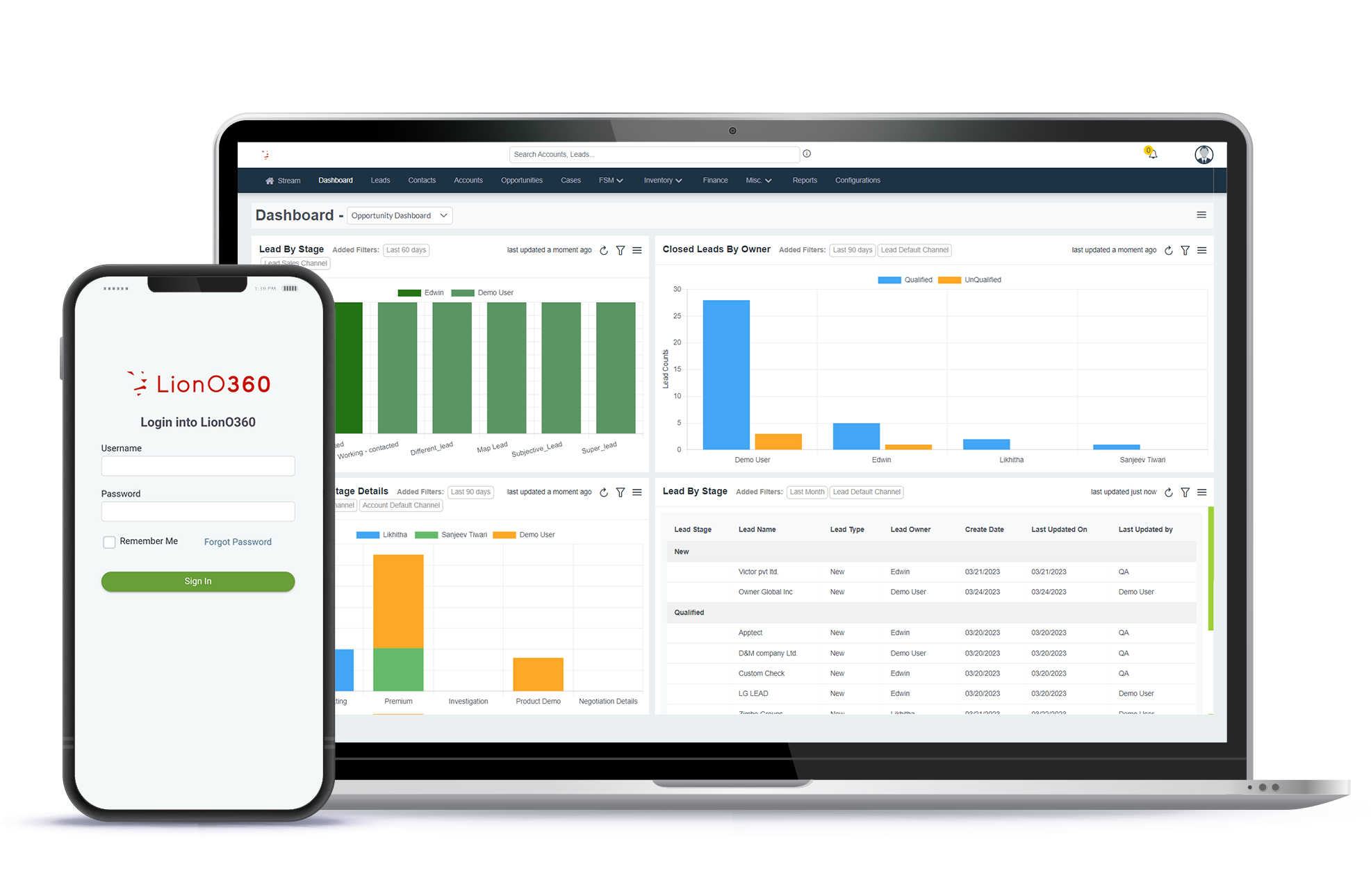
In today’s highly competitive business landscape, having an efficient sales process is not just a luxury; it’s a necessity. A well-structured sales process streamlines lead generation, conversion, and customer retention, ensuring that your sales team operates at peak performance. This guide will walk you through the crucial steps to build an efficient sales process that enhances productivity, improves customer experience, and drives revenue growth.
A sales process is a repeatable sequence of steps that a salesperson follows to convert prospects into paying customers. It provides a structured approach to selling and ensures consistency in interactions with potential buyers. A robust sales process helps sales teams qualify leads, nurture relationships, handle objections, and close deals effectively.
Why Do You Need an Efficient Sales Process?
- A structured process provides clarity on sales outcomes and revenue forecasting.
- Businesses can replicate successful strategies across teams and geographies.
- An optimized process helps filter quality leads, resulting in improved closing ratios.
- Consistency in sales interactions builds trust and fosters long-term relationships.
- A defined process allows for better monitoring and refinement of sales tactics.
Steps to Build an Efficient Sales Process
1. Define Your Sales Stages
The first step in building an efficient sales process is identifying the key stages your prospects go through before making a purchase. Common sales stages include:
- Prospecting: Identifying potential leads through research, referrals, and marketing campaigns.
- Qualifying Leads: Assessing whether the prospect is a good fit based on need, budget, and decision-making authority.
- Initial Contact: Engaging with the prospect via email, phone, or meetings.
- Presenting & Demonstrating Value: Showcasing your product/service and addressing customer pain points.
- Handling Objections: Overcoming potential concerns or barriers to purchase.
- Closing the Deal: Finalizing the sale and securing the commitment.
- Follow-up & Retention: Ensuring customer satisfaction and fostering long-term relationships.
2. Identify Your Ideal Customer Profile (ICP)
An efficient sales process starts with targeting the right audience. To do this, create an Ideal Customer Profile (ICP) based on key characteristics such as:
- Industry type
- Company size
- Pain points and challenges
- Budget constraints
- Decision-making authority
Focusing on your ICP helps streamline prospecting efforts and ensures better conversion rates.
3. Implement a Lead Qualification Framework
Not all leads are worth pursuing. Implementing sales lead generation framework such as BANT (Budget, Authority, Need, and Timing) or CHAMP (Challenges, Authority, Money, Prioritization) ensures that your sales team prioritizes high-quality prospects.
4. Leverage Technology for Automation
Automation plays a crucial role in building an efficient sales process. Key tools include:
- Customer Relationship Management (CRM) Software: Platforms like LionOBytes – LionO360 CRM, HubSpot, or any other helping in lead management, monitor customer interactions, and forecast sales.
- Email Automation Tools: Automating follow-ups, nurturing sequences, and engagement emails saves time and increases efficiency.
- Sales Intelligence Tools: Solutions like LinkedIn Sales Navigator or ZoomInfo provide valuable insights on prospects.
- Proposal and Contract Software: Tools can streamline proposal creation and contract management.
5. Create a Value-Based Sales Approach
Customers buy solutions, not just products. Instead of focusing solely on features, emphasize the value your product/service brings. This includes:
- Understanding customer pain points
- Demonstrating how your offering solves their challenges
- Providing case studies and success stories
- Offering a consultative approach rather than a hard sell
6. Develop a Strong Sales Enablement Strategy
Sales enablement ensures your team has the necessary resources, content, and training to close deals effectively. This includes:
- Creating sales playbooks and scripts
- Providing ongoing training and workshops
- Equipping the team with relevant case studies and testimonials
- Collaborating closely with marketing for aligned messaging
7. Implement Performance Metrics & Continuous Improvement
Tracking key performance indicators (KPIs) helps measure the effectiveness of your sales process. Common KPIs include:
- Lead conversion rate
- Sales cycle length
- Customer acquisition cost (CAC)
- Average deal size
- Churn rate
Analyzing these metrics helps identify areas of improvement and optimize the sales strategy continuously.

8. Foster a Customer-Centric Culture
An efficient sales process isn’t just about closing deals; it’s about building relationships. Train your team to:
- Listen actively to customer needs
- Provide value-driven consultations
- Follow up diligently and nurture long-term engagement
- Seek customer feedback for process improvements
9. Align Sales with Marketing
Sales and marketing alignment ensures a seamless lead nurturing process. Collaboration between the two teams can be achieved through:
- Shared goals and KPIs
- Regular communication and feedback loops
- Unified messaging and branding
- Lead scoring and qualification agreements
10. Encourage a Growth Mindset & Adaptability
The business landscape is constantly evolving. Encourage your sales team to:
- Stay updated on industry trends
- Experiment with new sales strategies
- Adapt to changing customer behaviors
- Leverage new technologies to stay competitive
LionOBytes – LionO360 CRM:
LionO360 CRM is a comprehensive solution that enhances sales process efficiencies, productivity, and customer engagement. By implementing the steps outlined in this guide, businesses can create a sales framework that drives higher conversion rates, boosts revenue, and enhances customer satisfaction.
LionO360 CRM is more than just a standard CRM; it is a fully integrated solution that offers end-to-end sales management for businesses. The user-friendly interface, combined with advanced automation, allows your sales team to track leads, manage opportunities, and close deals faster.
LionO360 CRM sales process is an effective option for businesses that aim to optimize their sales process and enhance overall productivity. Whether you are a small business or a larger enterprise, LionO360 CRM will deliver the flexibility and features necessary for an effective solution. Investing in the right tools, aligning teams, and focusing on delivering value to customers will not only refine your sales strategy but also create a sustainable path to long-term success. If you’re looking to take your sales process to the next level, start implementing these best practices today!
Are you ready to transform your sales strategy? Explore LionO360 CRM and Schedule your free demo today!
Call us at +91 9266133544
Frequently Asked Questions
1. What is a sales process and why is it important?
A sales process is a repeatable sequence of steps that salespeople follow to convert prospects into paying customers. It is important because it provides a structured approach to selling, ensuring consistency in interactions and helping sales teams effectively qualify leads, nurture relationships, handle objections, and close deals.
2. How do I define my sales stages?
To define your sales stages, identify the key steps your prospects go through before making a purchase. Common stages include:
- Prospecting: Identifying potential leads.
- Qualifying Leads: Assessing fit based on need, budget, and decision-making authority.
- Initial Contact: Engaging with prospects.
- Presenting & Demonstrating Value: Showcasing your product/service.
- Handling Objections: Overcoming concerns.
- Closing the Deal: Finalizing the sale.
- Follow-up & Retention: Ensuring customer satisfaction.
3. What is an Ideal Customer Profile (ICP) and why do I need one?
An Ideal Customer Profile (ICP) is a detailed description of the type of customer that would benefit most from your product or service. It includes characteristics such as industry type, company size, pain points, budget constraints, and decision-making authority. An ICP helps streamline prospecting efforts and leads to better conversion rates by targeting the right audience.
4. How can technology help in building an efficient sales process?
Technology can automate various aspects of the sales process, leading to increased efficiency. Key tools include:
- CRM Software: For tracking leads and customer interactions.
- Email Automation Tools: For automating follow-ups and engagement emails.
- Sales Intelligence Tools: For insights into prospects.
- Proposal and Contract Software: For streamlining proposal creation and management.
5. What are some key performance metrics to track in my sales process?
Key performance indicators (KPIs) to measure the effectiveness of your sales process include:
- Lead conversion rate
- Sales cycle length
- Customer acquisition cost (CAC)
- Average deal size
- Churn rate













